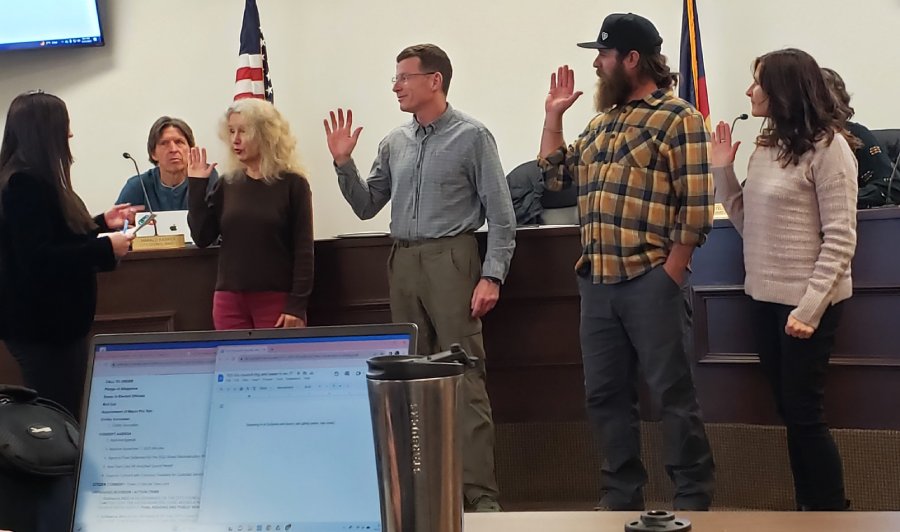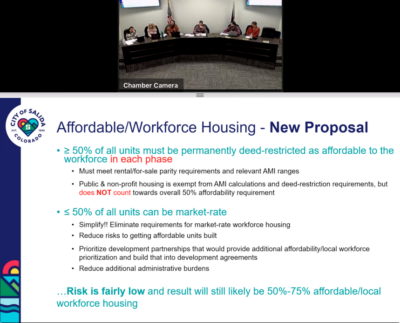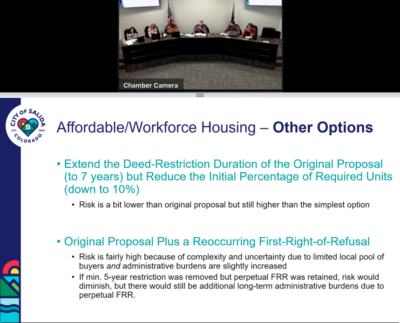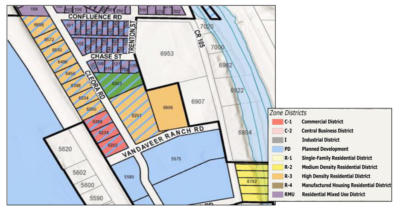
Salida City Council members sworn in after 2023 election. Left to right: City Clerk Erin Kelly, returning members Alisa Pappenfort and Dan Shore (Mayor), with new members Aaron Stephens and Suzanne Fontana. Treasurer Ben Gilling was ill and sworn in remotely. Merrell Bergin photo
The December 5 meeting of the Salida City Council (SCC) featured, among other business, a vote on Ordinance 2023-16, approving modifications to certain parcels in the South Ark Neighborhood area of the Vandaveer Ranch property; votes on Ordinances 2023-17 and 18, approving the annexation and change in zoning of the Flour Mill property; and a first reading on Ordinance 2023-19, intent to negotiate with the Artspace organization for a ground lease for the property at First and D Streets.
But first came citizen comment.
Jackie Berndt stated that she had been at the previous night’s work session and had concerns spawned by reports on social media that some people had not heard about the survey on the F Street Plaza closure. “I really would like to see it opened up again.”
Robin Anderson talked about restrictions at the Salida Hot Springs Aquatic Center “that are currently limiting use of the pool”, including 90-minute reservations on lap lanes that then go unused: “How much money is coming in from reserved lanes? No one uses the reserved lanes for the entire 90 minutes.”
Mayor Dan Shore promised to take the latter up with her at a later time.
Mark Wisehart had two issues: On the Salida Scout Wave: “This feature is dangerous for boaters and fishermen – it’s an abomination. I would like to see the beach removed and see the river returned to its natural state.”
On residency requirements for SCC members, he wanted to know if member Harald Kasper is currently living outside city limits and therefore ineligible to retain his seat.
(Kasper addressed the issue during Council reports at the end of the meeting, stating that for the time being, he is still residing at his residence on Second Street.)
A few people spoke up in defense of Danny Taylor’s right to open-carry an AR-15 on F Street, including Taylor himself. In fact, Taylor became quite vehement on the subject of a possible ordinance banning open-carry downtown: “You guys are going to have to deal with the fact that these rights have not been given by you! They cannot be taken by you!”
(Editor’s note: In fact, they can. Colorado state law does not prohibit local governments from enacting open-carry bans.)
“I assure you we [open-carry advocates] are reasonable people,” said Christopher Welter. “I believe in what [Taylor] stands for,” but declined to state what that was. “It is truly disgusting to me how much hate there is towards Danny…our rights do not end where your feelings begin.”
Luis Enriquez spoke of being an immigrant from El Salvador and a friend of Taylor’s who found it “thrilling to exercise my Second Amendment rights.”
Finally, Kat Bean spoke about her idea for an arts center with “starter rentals” housing for young people, calling it “stepping stone housing limited to those with little or no rental history.” Her proposal is in place of what is currently planned by Artspace at 1st and D Streets.
Before turning to Council business, the SCC held a public hearing as the Liquor Licensing Authority for Elevation Beer Company, for a brewpub to be located at 146 West First Street. The motion to approve the license passed unanimously.
South Ark Neighborhood Public Hearing
Community Development Director Bill Almquist once again went over the rationale for Ordinance 2023-16 and the options for workforce housing in the South Ark Neighborhood. Option One would be eliminating the market-rate workforce housing requirement. Instead, it would favor “50 percent permanently deed-restricted [as affordable housing] and 50 percent [being] market-based – half of these units would be set aside for local workforce…market-rate housing will help subsidize affordable housing.”

Options for Workforce Housing at the South Ark Neighborhood. Image courtesy of City of Salida.
Option Two would extend deed restriction to seven years from five, but reduce the number of deed-restricted units to 10 percent of the total proposed, or 40 units altogether.
Option Three would make 25 percent of all units, or 100 total, deed-restricted units for the local workforce, plus a first right of refusal for locals to purchase when the units went on sale.
This was a concept that Read McCulloch, Chaffee Housing Trust Executive Director, expanded on during public comment.
“I want to give locals first right of refusal. It’s virtually no risk to the developer. The first option goes to a local, then after 90 days, it can go on the open market,” said McCulloch. “Qualifying buyers [financially] is a laborious process – checking people’s local workforce credentials should take about fifteen minutes. I just want to see workers given priority, and the same clause applies each time – this is publicly owned land and we need to focus on public benefit.”

More options for workforce housing. Image courtesy of the City of Salida.
“I want to second everything Read said about how public land needs to benefit the public,” said BETCH President and CHA Board member Salty Riggs. “Why not make the first right of refusal [for locals] for the whole city limits, not just Vandaveer? Just a thought.”
“Any restriction carries a risk,” said Rob Gartzman. “It takes a commitment from the city too. The first thing we need to do is to make sure the infrastructure is in place…it’s going to come down to the city to commit to it. We are getting there to be sure, but you are asking developers to take less money – we have to think carefully about how we put restrictions in place.”
After closing the public hearing, Shore and council members discussed the pros and cons of the various options with Almquist, with the general consensus forming around an option that Almquist described as “Option Four”: “Getting rid of the five-year deed restriction, and just going for the 90-day right of refusal” on 25 percent of the units.
Council member Alisa Pappenfort proposed passing Ordinance 2023-16 with amendments. These were summed up by Almquist and Kasper as: “a minimum of additional 25 percent of housing units to be prioritized for Salida workforce either through affordable housing or non-income-based through first Right of Refusal.”, as well as getting rid of the seven-year deed of restriction requirement.
The amendments and the Ordinance itself finally passed unanimously to applause all around and an “Amen,” from Almquist.
Flour Mill Project
Senior City Planner Kristi Jefferson made the presentations for annexation and zoning changes (to R-3, or High-Density Residential) for the Flour Mill project, located at 6907 CR 105. She stated that the Planning Commission had recommended the project for approval, subject to conditions pertaining to the Inclusionary Housing requirements, public school sites, and fees in lieu for open space.

Map of Flour Mill Annexation. Image courtesy of City of Salida.
After brief public comments on the planned development, which will be covered at a separate hearing on January 11, 2024, the SCC voted to approve Ordinances 2023-17 and 18, as well as Resolution 2023-51, concerning a finding of facts for the Flour Mill annexation.
The SCC also passed Resolution 2023-52, amending the 2023 budget in four funds; and Resolution 2023-53, supporting applications for grant funds for South Ark Neighborhood infrastructure and approving local funds to match it.
Finally, the SCC passed Ordinance 2023-19 on the first reading, approving the option to pursue a ground lease for real property at First and D to Artspace. It set a date for the second reading on December 19 and actual negotiations on the lease will follow.
Almquist explained that the ground lease “is providing site control to Artspace for the property. That allows them to go after funding – it assures creditors that if Artspace does get funding, they have control of the site. [City Attorney] Nina [Williams] is working on language to assure that the city retains property rights, but Artspace will have development rights. The City could potentially repurchase the building after all financing is completed.”
Finally, before Council reports, Shore announces Interim City Administrator Christy Doon as the sole candidate for the Administrator position, saying that the matter of her hiring would be taken up at the SCC’s next meeting on December 19.





Recent Comments